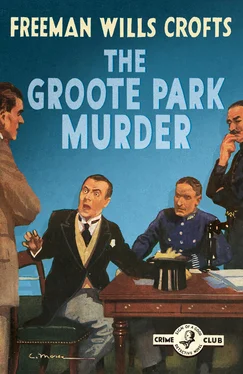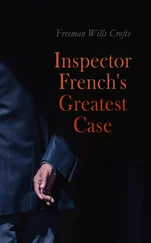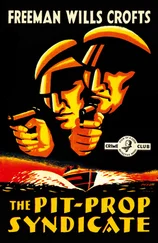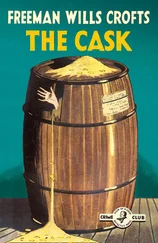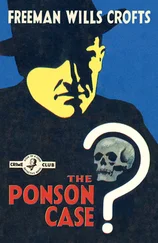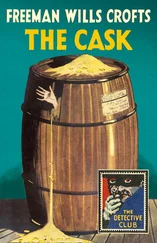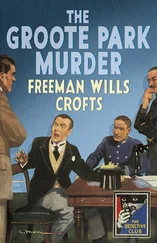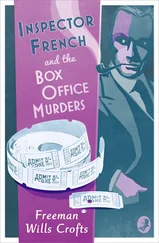Lying in the right-hand offset, close against the masonry of the side, and about twenty yards inside the mouth, was a body, apparently a man’s. Something in the attitude, even with the vague outline which was all that the gloom of the archway revealed, suggested disaster, and Ashe, after his first instinctive pause, hurried forward, half expecting what he would find.
His worst fears were confirmed as he reached the place and stood looking down with horror-stricken eyes at the battered and disfigured remains of what had once been a tall, strongly-built man. It was evident at a glance that he had been struck by a passing train, and there could be no doubt that death had been instantaneous. The injuries were terrible. The body seemed to have been dragged along the ground by the engine cow-catcher, rather than to have been struck and thrown cleanly aside. It looked even as if the head had got under the cow-catcher, for the back of the skull was crushed in like an eggshell, while the features were torn and unrecognisable as if from contact with the rough ballast. The back was similarly crushed and the chest scraped open. Three of the limbs were broken, and, what seemed to Ashe the most appalling spectacle of all, the fourth, the right arm, was entirely parted from the trunk and lay by itself between the rails some yards farther back along the line.
For some moments Ashe stood transfixed, overcome by the revolting sight. Then, pulling himself together, he turned and hurried back along the railway to report his discovery. ‘No. 17,’ the goods train he had accepted before going off duty, clattered past him near the Ballat Road bridge, and when he reached the station he found that its driver had seen the body and already given the alarm. The stationmaster, hastily summoned, had just arrived, and Ashe was able to let him have some additional details of the tragedy.
‘Police job,’ the stationmaster curtly decided. ‘You say the body is thrown clear of the trains?’
‘Up against the tunnel wall,’ Ashe agreed.
‘I’ll go and ’phone police headquarters now,’ went on the stationmaster. ‘You tell that man that’s just come off No. 17 that his engine will be wanted to run out to the place, and see Deane and get a passenger van shunted out. Then ’phone the west cabin what we’re going to do.’
The stationmaster hurried off, and Ashe turned to carry out his orders. Ten minutes later the special pulled out, having on board the stationmaster, Ashe, Sergeant Clarke of the City Police, as well as Dr Bakker, a police surgeon, and two constables. It stopped a few yards short of the mouth of the tunnel, and the men, clambering down from the van, went forward on foot. Even the hardened nerves of the police were not proof against the horrible sight which met their eyes on reaching the body, and all six men stood for some moments, shocked into silence. Then, with a muttered oath, Sergeant Clarke took charge.
‘We’ll not touch anything for a minute until we have a look round,’ he said, and, suiting the action to the word, he began to take stock of his surroundings.
The dead man was lying parallel to the rails in the offset, or flat track at the side of the line. He was dressed in a suit of light brown tweed, with brown tie and soft collar. On his feet were tan shoes, and his soft brown felt hat, cut nearly in two, lay between the rails some yards nearer to the station. The gleam of a gold watch chain showed beneath his partly open coat.
The manner of the happening was writ only too clearly on the ground. The first mark, some thirty yards farther into the tunnel, was a small stain of blood on the rail, and from there to where the body lay, the traces of the disaster were sadly apparent. Save as to the man’s identity, there was no mystery here. Each one of the little group standing round could reconstruct for himself how the tragedy had occurred.
Sergeant Clarke, having observed these details, turned slowly to his companions.
‘Who found the body?’ he asked, producing a well-thumbed notebook.
Both Ashe and the driver claiming the distinction, Clarke took statements from each.
‘It’s clear from the marks,’ he went on, ‘that the man was killed by an incoming train?’ The stationmaster at whom he glanced, nodded decisively. ‘Now, what trains pass through during the night?’
‘Down trains?’ the stationmaster answered. ‘There are four. First there’s a local passenger from Harrisonville; gets here at 8.50 in the evening. The next is the mail, the through express for the north. It passes here at 11.10 p.m. Then there’s a goods gets in about midnight, and another goods about 2.30 a.m. These are not very regular, but we can get you the time they arrived last night.’
The sergeant nodded as he laboriously noted these details.
‘What about the engines of those trains?’ he asked. ‘No marks found on any of them?’
‘None reported so far. All the engines come off here—this is a locomotive depot, you understand—and they’re all examined by the shed staff before stabling. But we can have them looked over again if you think necessary.’
‘It might be as well.’ The sergeant wrote for some seconds, then resumed with a slightly consequential air: ‘Now tell me, who would be the last person to walk along the line, I mean the last person before this’—he looked at his notes—‘this Signalman Ashe?’
‘I could hardly answer that question offhand,’ the stationmaster said slowly. ‘The last I know of would be the permanent way men leaving work about six last night. But some of the station staff or the locomotive men might have been by later.’ He turned to the signalman. ‘What about you, Ashe? Don’t you come to work by the railway?’
‘Sometimes,’ the man admitted, ‘but there weren’t no body here when I passed last night.’ The sergeant fixed him with a cold eye.
‘What time was that?’ he demanded.
‘About 8.48. My shift doesn’t begin ’til 10.00 p.m., but last night I came in earlier because I wanted to make a call up town first. But I know the time it was because No. 43—that’s the passenger from Harrisonville he was speaking of’—Ashe jerked his head towards the stationmaster—‘she passed me just a few yards on the other side of the tunnel. If she had put this man down I should have seen him.’
‘But it was dark at that time.’
‘Ay, it was dark, but it weren’t here for all that.’ Ashe expectorated skilfully. ‘Why, if it had been, I’d have fallen over it, for I was walking down the offset.’
Again Clarke wrote laboriously.
‘Well, Stationmaster,’ he said at length, ‘I think we’ll get the body moved, and then I should like to have those engines looked at again. I suppose, Doctor, there’s nothing you can do here?’
Dr Bakker having signified his approval, the remains were lifted on to a stretcher and placed on the floor of the van, the melancholy little party climbed on board, and the train set back to Middeldorp station. There the body was carried to a disused office, where it would remain until arrangements could be made to remove it to the morgue. The railwaymen were dismissed, and Dr Bakker and the sergeant set themselves to make the necessary examination.
The clothes were soon stripped off, and Clarke took them to the table in an adjoining room, while his colleague busied himself with the remains. First the sergeant emptied the pockets, making a list of the articles found. With one exception, these were of the kind usually carried by a well-to-do man of the middle class. There was a gold watch and chain, a knife, a bunch of keys, a half-filled cigarette case, some fifteen shillings in loose money, a pocketbook and three folded papers. But in addition to these, there was an object which at once excited the sergeant’s curiosity—a small automatic pistol, quite clean and apparently new. Clarke drew out the magazine and found it full of shells. There was no trace in the barrel of a shot having been fired.
Читать дальше
